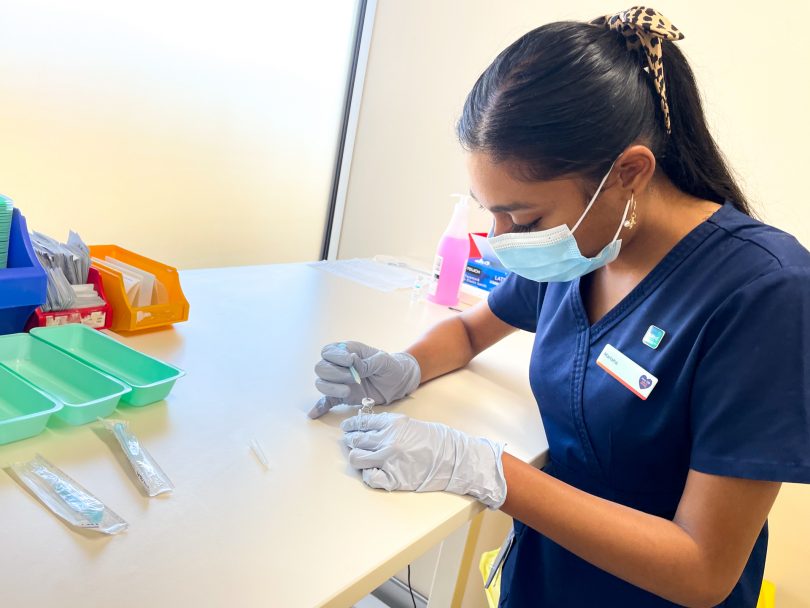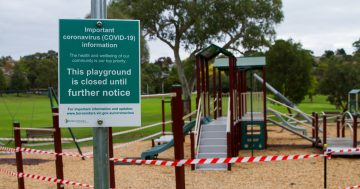
Registered nurse Marisha Christian prepares a COVID-19 vaccine at the new Calvary Hospital vaccination centre. Photo: Supplied.
Nearly 18 months into the pandemic, I wonder who is in charge of anything to do with COVID-19.
Recently, some friends of mine had to race to the UK because their daughter became critically ill. She’s worked in London for many years and has no family there. The palaver for her parents to reach her would have put off most people, but they persisted because she was gravely ill.
Eventually – and happily – she recovered to the point where she was well enough to travel home.
Her parents developed a detailed plan to quarantine at home in Canberra. All three had been vaccinated, and it would mean the daughter could receive the close personal care she needed – her mother is a nurse – with no risk of cross-infection from other rooms in quarantine.
However, the NSW Government refused the request. It was also submitted to the ACT Government, but it didn’t consider the request given that NSW had declined the proposal.
So off to a ‘medi-hotel’ they went. During the second week, we discussed what they were looking forward to when they were released from quarantine.
A piece of toast was the answer.
I was surprised to find the kitchen at their apartment had been totally disabled, save for an electric kettle, so they couldn’t actually cook a piece of toast. This was justified by the authorities because of the risk of fire, apparently, despite these apartments usually being occupied by tourists who manage to get by without setting the place alight.
Yet various government ministers, including Prime Minister Scott Morrison, who have recently travelled overseas, were allowed to quarantine at home or at The Lodge. I presume their kitchens weren’t disabled.
Indeed, any federal minister who has travelled overseas during the COVID-19 pandemic has not been subject to the same quarantine requirements as the general public.
I’m struggling with the concept of equity and fairness here.
But here is where it becomes bizarre.
The ANU recently developed a proposal for consideration by the ACT Government that would enable it to bring back overseas students. The proposal included a hotel quarantine arrangement in one of their halls of residence. This proposal was knocked back on the basis that there were no individual kitchens in each room.
However, 30 or more officials who accompanied Prime Minister Morrison to the G7 summit in the UK recently were quarantined in the same hall of residence at ANU on their return.
So we have a rule for NSW, another for the ACT, and another for the feds.
The people who don’t suffer out of any of these inconsistencies are those making the rules or supervising their implementation.
I would suggest the public is starting to suffer from COVID-19 exhaustion™ because of many inconsistencies, including those I have just mentioned. Goodwill is heading out the door at an alarming rate.
In this past dramatic week, the ACT has been labelled an ‘orange zone’ by Victoria. Western Australia has described the ACT as a ‘low risk’ jurisdiction. We can’t even get consistency in the nomenclature, or indeed what these descriptors mean.
The vaccination rollout is just one more example of inconsistency. People in rural Australia are having a particularly tough time accessing the appropriate vaccine. The messaging has been an unmitigated muddle, capped off by a late-night announcement after National Cabinet that young people can ask for the AstraZeneca vaccine.
Australia is a lot better off than many countries, particularly in terms of the COVID-19 death rate. The nation has been well served by its chief health officers (CHO).
But we’re going to need to rethink our strategy.
First, we need consistency and unity of purpose. We don’t need heavy handed decisions, especially in regions where COVID-19 hasn’t appeared for around a year. We need to re-engage healthcare consumers back at the health policy table.
They seem to have been thrown out with the bathwater when the pandemic hit – logically because decisions had to be made quickly and it takes time to properly engage consumers.
We know that health policy is better developed and implemented if consumers are genuinely engaged as partners. Consumers would be able to guide CHOs about messaging and how inconsistencies will impact their ability to direct the public appropriately.
As a nation, we are seeing jurisdictions acting inconsistently. We need to get back to being a country that has good health of all Australians as its focus.
We must stop having jurisdiction pitted against jurisdiction.
We must get back to responses being proportionate to risk.
Then we might avoid COVID-19 exhaustion™.
Anne Cahill Lambert AM has worked in the health system for more than 40 years. She is the former chair of the ACT Remuneration Tribunal.
















